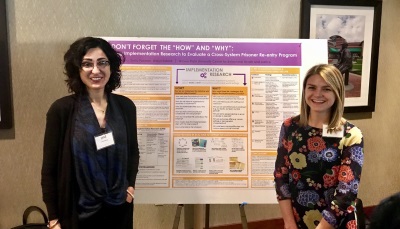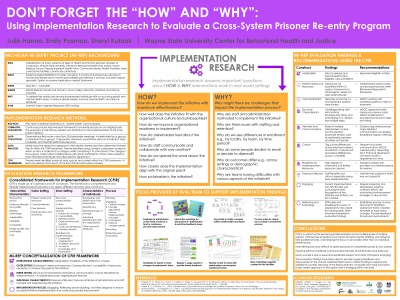Center for Behavioral Health and Justice June 2019
On May 9, Julie Hanna (left below) and Emily Pasman (right below) of the Center for Behavioral Health and Justice presented a poster (PDF) on the implementation of the Michigan Re-entry Project (MI-REP) at the Michigan Association for Evaluation (MAE) Annual Conference. The poster highlights the importance of implementation research and summarizes findings and recommendations based on use of the Consolidated Framework for Implementation Research. Findings have been used to provide ongoing feedback, support process improvements, and to obtain funding to expand into additional counties.

The Michigan Re-entry Project (MI-REP) was implemented in 2017 with funding from SAMHSA's State Targeted Response to the Opioid Crisis (STR) to fill a service gap for individuals in prison who have co-occurring mental health and opioid use disorders. The program is a multi-system collaboration between the Center for Behavioral Health and Justice (CBHJ), the Michigan Department of Health and Human Services (MDHHS), Michigan Department of Corrections (MDOC), County Prepaid Inpatient Health Plans (PIHPs), and University of Massachusetts Medical School (UMMS). MI-REP utilizes the MISSION (Maintaining Independence and Sobriety through Systems Integration, Outreach, and Networking) model, which is on the National Registry of Evidence-Based Practices. MISSION is based on five key components: Critical Time Intervention, Dual Recovery Therapy, Peer Support, Vocational Support, and Trauma-Informed Care. Read more about the dual-role of the CBHJ in the MI-REP initiative here.
Hanna, J., Pasman, E., & Kubiak, S. (2019, May). Don't forget the 'how' and 'why': Using implementation research to evaluate a cross-system prisoner re-entry program. Poster session presented at the Michigan Association for Evaluation Annual Conference, Lansing, MI.
